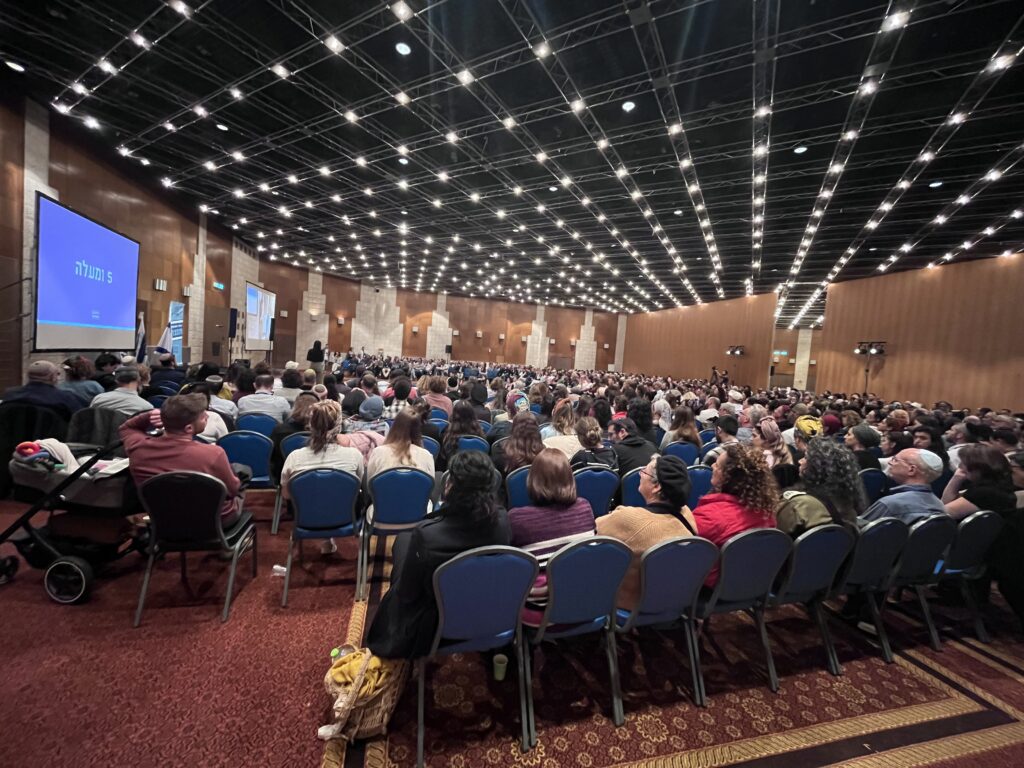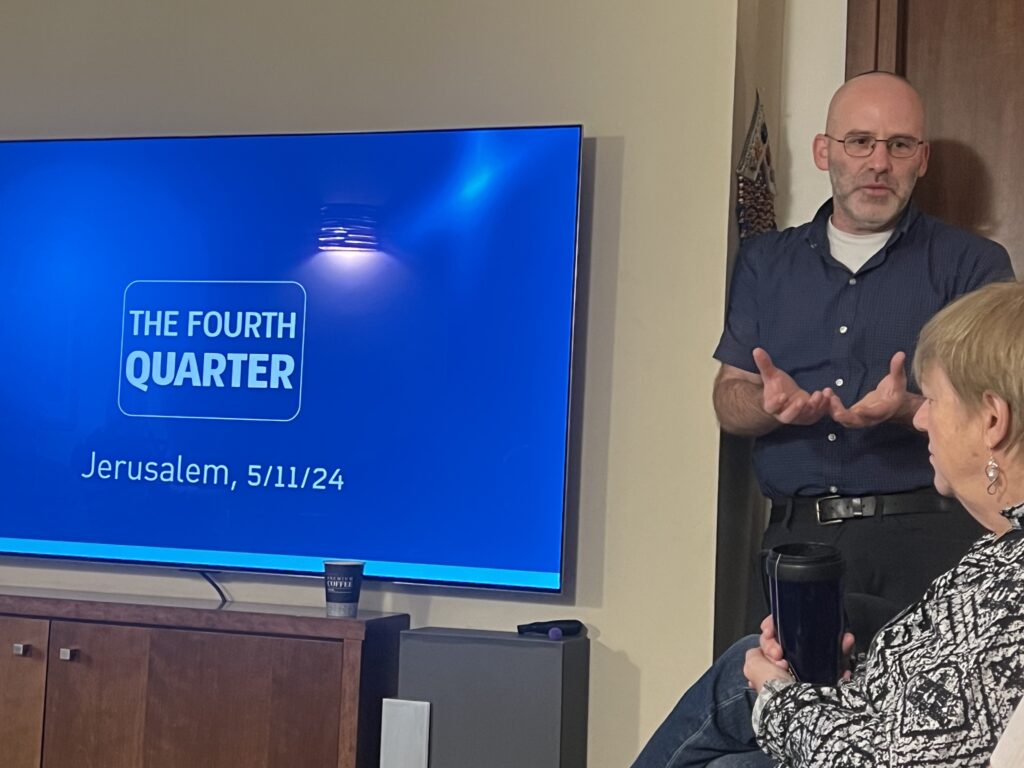In the immediate aftermath of Hamas’s October 7 invasion, the Israeli government essentially stopped functioning. Volunteers from civil society stepped up to the plate, distributing much-needed equipment and food to soldiers, working with refugees in their hotel homes, organizing transportation, and providing emotional and physical support.
Even before Oct. 7, an organization called the Fourth Quarter was trying to narrow the gaps between Israelis that the country’s current coalition has been manipulating for its own destructive benefit.
Founded in 2022 by strategic consultant and historian Yoav Heller; organizational psychologist Ella Ringel; PR agency owner Eitan Zeliger; and Ori Helman, whose background is in tech, civil society and government, the organization takes its name from a phenomenon that has been repeated throughout history: Nations tend to do well for the first three quarters of their initial 100 years, then in the final 25 years, they fall apart.
The American Civil War happened in the fourth quarter following the founding of the United States.
The Communist and French revolutions also crumbled at the beginning of their respective fourth quarters.
Closer to home, both Solomon’s kingdom and the Hasmonean dynasty were beset by internal strife in theirfourth quarters, allowing external enemies to destroy the Jewish State.
That pattern is happening again.
In modern Israel’s first quarter, there was a clear, shared mandate: to establish a state.
The next quarter was all about building national infrastructure.
By the third quarter, from 1998 to 2023, Israel had a world-leading economy. Our defense was strong and we believed we were no longer under existential threat.
Israel’s first prime minister, David Ben-Gurion, foresaw what was coming.
When queried if he was satisfied with the establishment of the Jewish State, he replied, “Ask me when the state of Israel is 75 years old … at that point, assuring the rightness of our path will require redefinition, based not on what was but on what will be.”
I wanted to know more about the Fourth Quarter, so my wife, Jody, and I recently hosted Haggai Lavie, one of the Fourth Quarter’s leaders in Jerusalem, for an English-language parlor meeting at our home.
Lavie didn’t mince words.
“If we continue the way we’re going now, it’s going to end in destruction. There won’t be a state of Israel. I know that’s very harsh. But something radical needs to change for this not to happen for the first time in Jewish history.”
The extremes, Lavie adds, “are getting stronger,” with their opponents labeled “traitors” and “enemies of the state.” Once they’re setting the tone, an internal war is inevitable.
There’s a solution to this fourth quarter crisis we find ourselves in: broad agreements and unity, rather than one side trying to force-feed its goals on an unreceptive public.
But when the Fourth Quarter places “unity” as its goal for national repair, people respond with incredulity. “That’s what’s going to solve our problems? Come on,” Lavie says he hears all the time.
To which Lavie nods in agreement. “It’s a tough thing to do because if you want to reach broad agreement, it means you will have to compromise on some of your values. It’s impossible for everybody to get 100% and still be able to live with other people.”
What we need is “trust,” which Lavie describes as “the attribution of good intentions.”
Lavie says he’s not talking about good intentions towards oneself or one’s country. “The question is if I think you have good intentions about me. Do you want me to have a good life? If so, then we have a lot we can do together.”
The flip side: “If I think you want to force your values on me, then I’ll stay away from you because you’re dangerous.”
Being able to argue is key. “Without it, you can’t agree on anything. Which leaves only one option: to win while the other side loses. In that case, both sides lose.”
The Israeli public must understand everyone will have to give up on certain things, so we can all live under the same canopy. “That’s a change that Oct. 7 taught us. If you’re working against unity, you’re working against our very existence.”
So, how do we get there?
There’s a “huge moderate majority where Israelis agree about more than they disagree,” Lavie stresses, “but hatred has become far worse and doesn’t let this group cooperate anymore.” After all, “when you really listen to someone, they might persuade you. And who wants to change his or her own opinions?”
The Fourth Quarter proposes the creation of a new “Israeli story,” one that incorporates a diversity of views, including some that many Israelis will be “barely able to swallow,” Lavie acknowledges.
It seems to be working.
At one parlor meeting, Lavie recalls a participant standing up and saying, “’Israel is a liberal democracy and those values need to be shaping the system here.’ And no one in the audience yelled or flipped over a table. Then someone else said, ‘Israel is a Jewish state and Jewish values should be dominant in the public sphere.’ And again, no one left.”
The Fourth Quarter holds large-scale seminars, nightly Zoom meetings and around 100 monthly salon meetings in private homes, like ours. Forty percent of its members are secular, 35% religious Zionist, 21% traditional, 4% Haredi and 1% Arab.
While some 150,000 Israelis of all political and religious stripes have joined the organization, “we need a million” to move from what Lavie dubbed “submission politics” – where one side demands the other bend to its will – to “hospitality politics,” where the goal of the “host” is to “make sure that all the different groups in society feel at home.”
The question before Israel now is: Can we as a nation be that family with the secular father, the national religious mother, the ultra-Orthodox son-in-law and the gay daughter? Or will too many of us opt to sit shiva, unwilling to bridge our differences?
To learn more, visit: https://q4israel.org.il/english/
Remember how, a few posts back, I shared an AI-generated “podcast” of one of my columns? I’ve done it again here with a NotebookLM-based dialogue about Haggai’s parlor meeting. Check it out here.
I first covered the Fourth Quarter for The Jerusalem Post.



